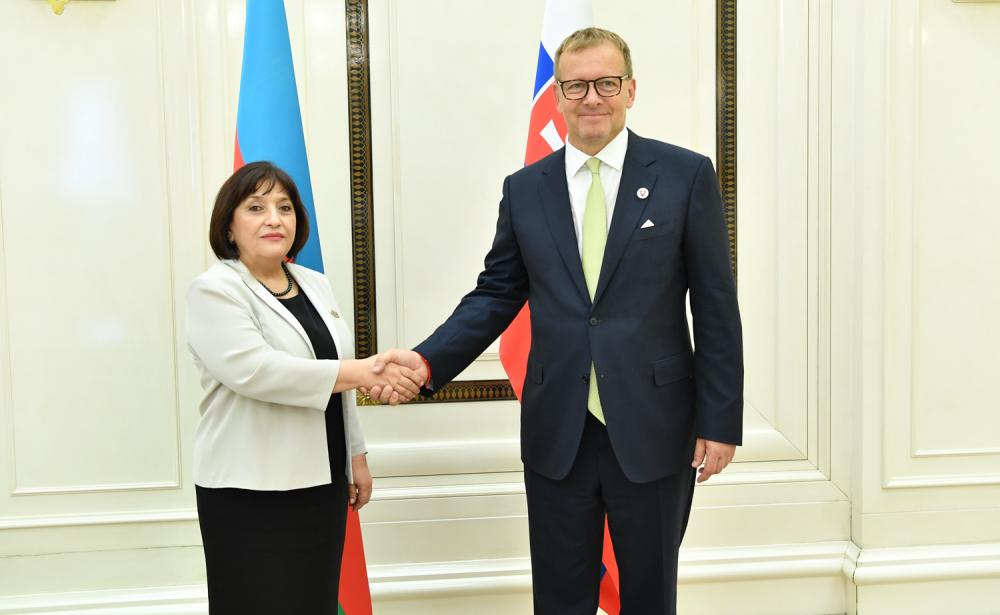A Meeting of Chair of Milli Majlis Sahiba Gafarova with Speaker of National Council of Slovak Republic

A Meeting of Chair of Milli Majlis Sahiba Gafarova with Speaker of National Council of Slovak Republic
Chair of the Milli Majlis Sahiba Gafarova met on 13 June the delegation led by Chairman of the National Council of the Slovak Republic Boris Kollár, in Azerbaijan on an official visit.
First, there was a tête-à-tête to talk over the two-way interstate and inter-parliamentary relations.
Then, there was an expanded meeting at which Sahiba Gafarova gave the Slovak visitors a warm welcome and described their coming to Azerbaijan as a manifestation of the amity between our countries. She also remembered her own visit to Slovakia last year and underlined the importance of the conversations she had had there. It is hoped, according to Mrs Gafarova, that the meetings to be held during the current visit of the speaker of the Slovak parliament to Azerbaijan will bring about deeper and broader bilateral relations. In general, Mrs Gafarova added, conversations held during high-status delegations’ visits are central to the progress of the relations. Azerbaijan and Slovakia have to date signed a number of documents encompassing the political, economic, trading, humanitarian and other topicalities and forming the legal frameworks for our interaction.
That the Slovak delegation will, during their visit, travel up country is importance in that it will let them become familiar with Azerbaijan, a multicultural country with the respect for different cultures, religions and races being one of the moral pillars of her nation, according to Sahiba Gafarova. The adepts of various religions and diverse ethnic groups have lived together in peace and accord in this country for centuries on end. Well, the guests themselves had had the opportunity to see for themselves the temples and facilities of different religions – Catholic and Orthodox churches, synagogues and mosques – operating side by side in Baku as well as in the provinces of Azerbaijan, Mrs Gafarova added.
As she was highlighting the special place parliaments have in the system of inter-state relations, Sahiba Gafarova underscored the importance of reciprocal visits of speakers and members of parliaments for the furtherance of bilateral co-operation. It is laudable that friendship groups function in both sides’ legislatures because those groups keep up the on-going experience and information exchange, in the opinion of Mrs Gafarova.
There are fine opportunities to set yet higher standards for our interaction in such international entities as the PACE, the OSCE PA, the NATO PA and the Inter-Parliamentary Union, according to the leader of the Azerbaijani parliament.
She referred to the Slovak guests’ trip to the liberated Azerbaijani lands in general and to our cultural capital of Shusha in particular, and said that Armenia had ravaged all the towns and villages there, and had vandalised the monuments of culture and creed during the occupation time. So, Azerbaijan started large-scale restoration and re-construction once her territories had been freed. The whole infrastructure is being built from scratch over there; new towns and villages are under construction in Garabagh and East Zangazur that were declared the green energy zones. All that revival work and the eventual return of the IDPs to their native parts are greatly impeded by the fact that Armenia had stuffed those provinces full of mines at the time, though.
Meanwhile, Azerbaijan continues her efforts towards a lasting peace and stability in the region, and wishes to talk about peace. The third trilateral meeting involving the president of Azerbaijan and the Armenian PM have taken place on the initiative of the EU Council’s president Charles Michel already. The Azerbaijani side is progressing purposefully towards signing a peace accord and hopes that Armenia, too, will honour its assumed obligations and take a constructive approach to the matter. The post-war period gave birth to new co-operation opportunities in the South Caucasus. The launch of the Zangazur Corridor in line with the relevant agreements will reshape the region completely as far as transport infrastructure is concerned. The European countries not barring Slovakia will be able to benefit from using that infrastructure and to gain access to new markets thanks to it.
Mrs Gafarova reiterated that the current visit of the Slovak delegation is going to turn a leaf in our inter-parliamentary connexions.
The Speaker of the National Council of the Slovak Republic Boris Kollár thanked for the kind welcome and hospitality before voicing satisfaction with the visit to Azerbaijan and the meetings held here. Slovakia, he said, attached a great importance to furthering its relations with Azerbaijan whilst the growth in our political, economic and humanitarian connexions served the common interest, and the on-going deepening of the inter-parliamentary links had a benevolent influence on our interaction in other fields.
As regards the trip to the liberated provinces of Azerbaijan and Azerbaijan’s cultural capital of Shusha, the Slovak parliament’s speaker voiced the high opinion he had formed of the restoration and rebuilding work going on there. He emphasised the importance of demining in this context.
Concerning the opportunities to deepen the co-operation with Azerbaijan, the fruit that those efforts are bound to bear will serve the well-being of our two nations, in the opinion of Mr Kollár.
Other topics of shared interest were discussed as the conversation went on.
The leader of the Azerbaijan-Slovakia inter-parliamentary connexions working group Anar Mammadov, the WG members Sadagat Valiyeva, Arzu Naghiyev and Malik Hasanov, our ambassador in Bratislava Rovshan Sadigbeyli and the Slovak envoy in Baku Milan Lajčiak as well as other officials took place in the meeting as well.
The Press and Public Relations Department
The Milli Majlis









